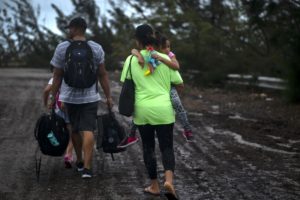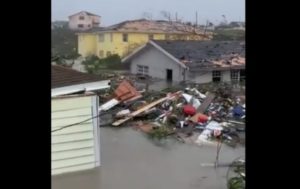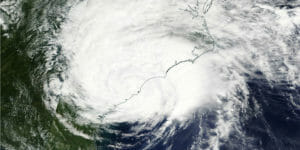Jabari Asim: After the Storm
New Orleans' sudden death was equivalent to the slow deaths of cities like Philadelphia, Newark and Oakland. So many of the same conditions exist; only the weather is different.WASHINGTON — Just a year ago, I watched — riveted — as television cameras captured the devastation of Hurricane Katrina. Like most Americans, I grew dependent on the compelling testimony of eyewitnesses and survivors of the legendary storm, supplemented by dramatic newspaper and Internet dispatches. I took it all in from the comfort of my easy chair, far from the danger and disorder.
David Dante Troutt’s encounter with the hurricane began in similar fashion. An author and a professor of law at Rutgers University, Troutt’s latest book is “After the Storm: Black Intellectuals Explore the Meaning of Hurricane Katrina.” He told me he watched the news footage with a mixture of horror and outrage. “I was struck immediately at an almost primordial level how the suffering of black people day in and day out created flashbacks to the historical memory of the middle passage, slavery, peonage and lynching,” he said. “I also had a sense of unjust patience — the expectation that people who clearly had so little and were stripped of what they had left would nevertheless be able to endure another day’s delay and another day’s delay until help arrived.”
Troutt’s scholarly work often involves the study of poverty — an issue that Katrina brought to our attention in extraordinary fashion. His interest in the ordeals of the poor in New Orleans eventually led him to a firsthand exploration of the flood-ravaged city. He arrived 100 days after the storm. “The magnitude of the destruction is just so awesome to behold that nothing I’d seen in the press captured it,” he recalled. “To say that 80% of the city was submerged is just hard to fathom unless you see it.”
For Troutt, the effects of Katrina were visible everywhere in New Orleans. “It’s a city were there has not been enough attention paid to urban planning. There’s very little verticality. It just goes on and on almost impossibly, and as you travel through it you think, ‘Surely I’m someplace where the water couldn’t touch.’ Then you’d look up and the waterlines would be right up at the roof.”
Considering the abundance of writing about Katrina, much of it fascinating, I asked Troutt why he felt moved to produce more. He believed that there were still angles that had yet to be fully explored. “This was not just a storm story,” he said. “This was a national story about entrenched poverty in American cities and about systematic vulnerability. What we saw as horrifying sudden death in New Orleans was really equivalent to horrifying slow death in cities like Philadelphia and Newark and Oakland, Calif. So many of the same conditions exist; only the weather is different. It was important to put together something that would contribute to the historical account of what this means to America and prescribe some ways to address some of these conditions.”
Troutt has a point. The shelves aren’t exactly crowded with works by black writers examining the debacle from an African-American perspective. There have been some exceptions, such as Michael Eric Dyson’s “Come Hell or High Water,” and Kevin Powell’s new book, “Someday We’ll All Be Free,” which contains a section on Katrina. Dyson has also contributed an essay to “After the Storm,” along with such scholar-writers as Sheryll Cashin, Derrick Bell and Katheryn Russell-Brown.
Unlike a number of observers, Troutt spends little energy on criticizing President Bush’s failure to keep the eradication of poverty on his agenda. “While extremely disappointing, the Bush administration’s failure to follow up on that particular promise is really not surprising,” he said. “We should not be shocked now to learn that this president had very little energy for this issue. What surprises me is we haven’t seen legislation coming out of both houses of Congress that really speaks to the predicament of the urban poor.”
Nor does Troutt leave that responsibility to lawmakers alone. He calls for average citizens — and especially members of the middle class — to revive their sense of responsibility toward others.
“The two most important things that the average citizen can do with respect to a reinvigorated social contract is to learn about the extent of racial and economic segregation that is permitted in this country in his or her name and to demand a more inclusive sense of community,” Troutt said. “The second thing is to put aside the notion that poor people, 10 years after welfare reform, are lazy folks accepting handouts. More often they are working people suffering from wage deflation in a country that’s gotten more expensive to live in.”
Even from my easy chair, I can see that this is sage advice.
Jabari Asim’s e-mail address is asimj(at symbol)washpost.com.
Your support matters…Independent journalism is under threat and overshadowed by heavily funded mainstream media.
You can help level the playing field. Become a member.
Your tax-deductible contribution keeps us digging beneath the headlines to give you thought-provoking, investigative reporting and analysis that unearths what's really happening- without compromise.
Give today to support our courageous, independent journalists.




You need to be a supporter to comment.
There are currently no responses to this article.
Be the first to respond.